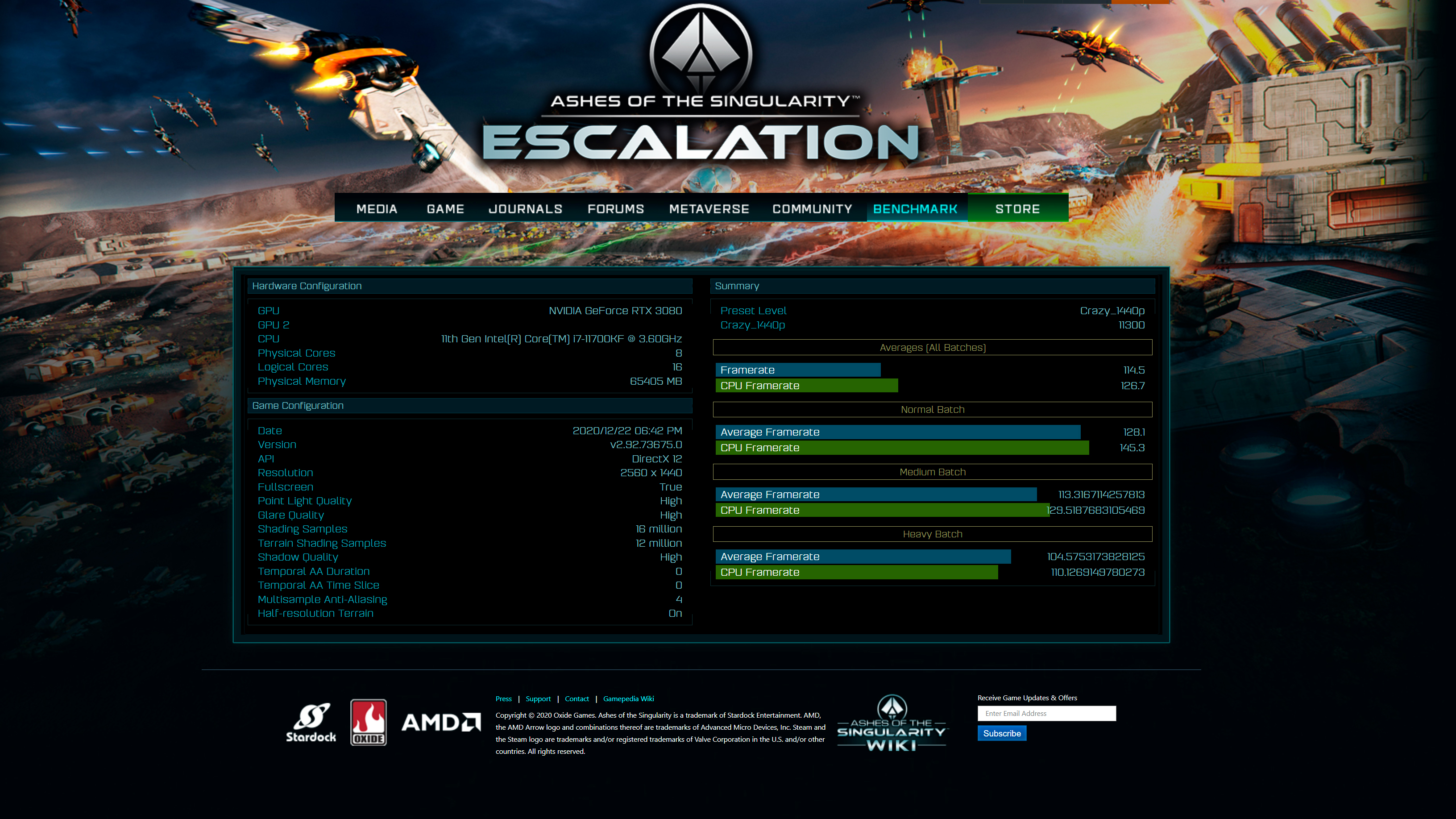Core i7-11700KF Edges Out Core i9-10900K In New Benchmark
The emergence of the Core i7-11700KF (via Tum_Apisak) has put the Rocket Lake rumor mill into action. If a certain Ashes of the Singularity (AoTS) submission is to be trusted, Intel could offer 11th Generation Rocket Lake KF-series chips without integrated graphics as well. In Rocket Lake's case, it would lack the Xe graphics engine.
As we've seen from a recent Rocket Lake report, the Core i9 and Core i7 models reportedly share the same eight-core, 16-thread configuration. With this bit of information, we can assume that the clock speeds will be what differentiate one model from the next. In theory, a Core i9 should have higher clock speeds than the Core i7, however, that doesn't seem to be the case with the Core i7-11700KF.
The Core i9-11900K, which made a brief appearance on Ashes of the Singularity, was allegedly operating with a 3.5 GHz base clock. The Core i7-11700KF from today's entry seemingly features a 3.6 GHz base clock. Perhaps, the base clock isn't meaningful, and Intel could end up using the boost clocks as the distinguishing feature between a Core i9 and a Core i7 SKU.
When paired with a GeForce RTX 3080, the Core i7-11700KF had an average framerate of 114.5 and a CPU framerate of 126.7 on the Crazy 1440p preset. For comparison, the Core i9-10900K put up a score with a framerate of 110.6 and a CPU framerate of 123.1, meaning that the Core i7-11700KF was up to 3.5% and 2.9% faster. It was a pretty impressive performance if you look at the details of each chip.
The Core i9-10900K not only has two more cores than the Core i7-11700KF, but also a 100 MHz base clock. Despite the handicap, the Core i7-11700KF still managed to pull ahead. While we know that the Core i9-10900K boosts up to 5.3 GHz, it remains a fact that the boost clock speed for the Core i7-11700KF is unknown.
Intel has previously bragged about its Cypress Cove microarchitecture, and how it'll offer consumers significant instructions per cycle (IPC) improvements up to two figures. We've already seen glimpses of what Cypress Cove cores are capable of so it's not improbable that an octa-core Rocket Lake chip can take on a deca-core Comet Lake part. Come the first quarter of 2021, we'll see whether Intel can deliver on its IPC promise.
Get Tom's Hardware's best news and in-depth reviews, straight to your inbox.

Zhiye Liu is a news editor, memory reviewer, and SSD tester at Tom’s Hardware. Although he loves everything that’s hardware, he has a soft spot for CPUs, GPUs, and RAM.
-
watzupken Actually I feel the results don't look promising. I am not sure about Ashes of Singularity, but most games are not optimized for high core counts, typically above 8 cores. So even with the extra 2 cores on the existing Comet Lake chip, it may not bring any meaningful improvement in games. So if I look at the results, its not that impressive. Beating Comet Lake is not unexpected and a must in my opinion since Intel have not introduce any improvement in IPC for 4 years now since the introduction of Skylake.Reply -
RodroX mmmm so 114.5 vs 110.6 FPS and 126.7 vs 123.1. I wonder other than for a benchmark result, Which human being on earth will be able to tell the diference between those numbers?, What about the 1% low?, How many runs did they?, What about RAM, Cooler?Reply
I mean, one could only bet intel should be able to beat its own old product. But I think is too soon to be drawing conclusions. -
TerryLaze Reply
Since ashes is very multithreaded it would mean that 20% less cores get the same results, there is no reason for multiple runs or for 1% mins when you are talking about a 20% difference.RodroX said:mmmm so 114.5 vs 110.6 FPS and 126.7 vs 123.1. I wonder other than for a benchmark result, Which human being on earth will be able to tell the diference between those numbers?, What about the 1% low?, How many runs did they?, What about RAM, Cooler?
I mean, one could only bet intel should be able to beat its own old product. But I think is too soon to be drawing conclusions.
And nobody is drawing any conclusions, it's just a benchmark with nobody knowing any details. -
RodroX ReplyTerryLaze said:Since ashes is very multithreaded it would mean that 20% less cores get the same results, there is no reason for multiple runs or for 1% mins when you are talking about a 20% difference.
And nobody is drawing any conclusions, it's just a benchmark with nobody knowing any details.
Well it does not seem not scale too much after 8 cores (not to say at all, specially when you OC both chips of the same gen 10700K and 10900K). So yeah Ashes may scale well with cores (up to 8), but high frecuency seems to be as important.
So I don't think 8 or 10 (or 16) cores will really make any diference: https://www.tomshardware.com/reviews/intel-core-i7-10700k-cpu-review/3. Even Ryzen Zen 2 results show that highest multicore frecuency is better than more cores.
